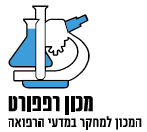
Prof.Yifat Merbl
Young and Promising researcher
The post-genomic era, in which the sequencing of the human genome was completed, brought with it new challenges in understanding disease mechanisms not caused by genetic mutations. Sequencing the human proteome, the collection of proteins expressed in the various tissues of our bodies, was completed about a decade ago, but our understanding of how proteins work and the mechanisms that control them is still very partial. This understanding is required because proteins are the functional units, ‘the operators’, which carry out all the processes in the cells of our bodies, and aberrations in their function cause a wide variety of diseases. Professor Yifat Merbl’s lab is trying to close this gap by developing innovative proteomic technologies to investigate and understand control mechanisms of protein function, modification and degradation.
One technology focuses on the ability to detect chemical changes, or protein post-translational modification, that occurs to proteins because of a change in environmental conditions, stress or disease states. With the help of a combination of computational tools, the laboratory has developed the ability to characterize many chemical changes on thousands of proteins simultaneously, thereby revealing new information regarding changes in the way proteins function in disease states or after drug treatment.
These technologies can be used for disease diagnosis and personalized medicine. Another technology the laboratory has developed allows for the characterization and analysis of the cellular system responsible for breaking down proteins – the proteasome. The proteasome is the cellular “trash can” that specializes in eliminating proteins which have completed their functions, or those that have been damaged and need to be sent for degradation. Looking at the contents of the cellular trash cans can reveal details about the cell’s lifestyle and what goes on inside, which are difficult to discover through other means. Using this technology, the team has discovered a pathological mechanism that enables cancer cells to escape detection by the immune system, by changing the cellular trash cans and the way the proteins inside them are broken down.
Several technologies and discoveries from the lab have been licensed with the aim of providing novel solutions for unmet needs in clinical diagnostics and therapeutic interventions.



